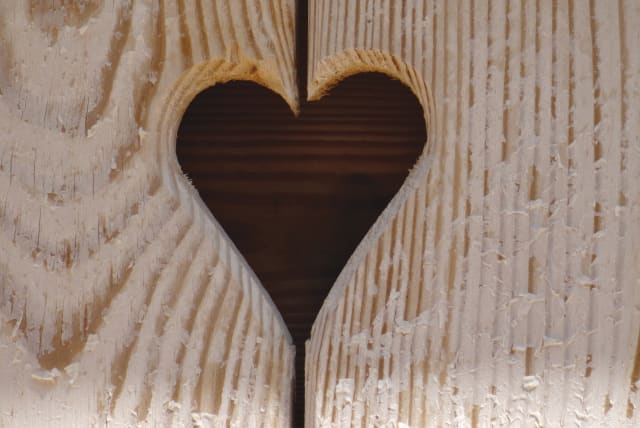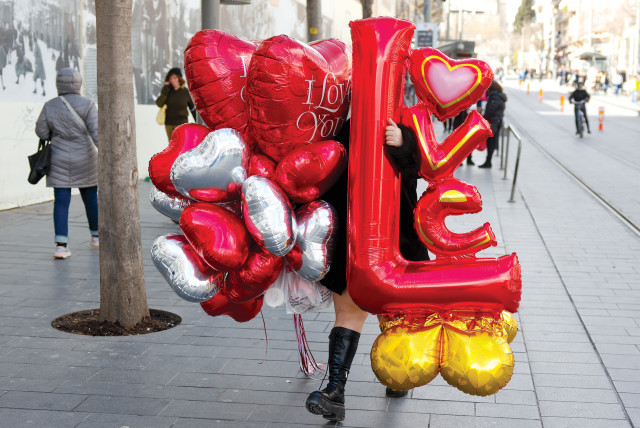Tu B'Av: How to strengthen relationships and hold on to love

What is the meaning of Tu B’Av for those who have been through that initial stage and come out the other side?
This past Tuesday evening, you may have noticed heart-shaped balloons blowing in the breeze outside restaurants, along with decorative floral arrangements, and more starry-eyed couples than usual out and about.
That’s because it was the night of Tu B’Av, the festival of love. Once a forgotten minor holiday, it has been revived in modern Israel as the Jewish Valentine’s Day, with red roses abounding in this celebration of romance.
The origins of the holiday date back to the time when young single Israelis would go out into the fields dressed in white – the girls wearing dresses borrowed from each other – dancing and trying to find their partners.
Accordingly, Tu B’Av celebrates young love: the love people experience when they have just met each other; the type of love where sparks fly and fantasies begin; the love in which a person wants to be with the other all the time, always looking for similarities while overlooking any differences.
This intense feeling, which is close to obsessional, has been described as a type of limerence in which chemical reactions in our bodies combine to make us, what poets over the years have named, lovesick. This is the stage where our rose-tinted glasses are on, and the other person was made just for us – or so it seems.
For those of us lucky enough to have experienced such love, we know that while we were in it, we thought it would last forever. We soon learned, however, that this stage is not sustainable, and perhaps rightly so. A world in which everyone walks around with a love sickness may provide material for a plethora of poetry and song but is less conducive to the business of everyday, productive living.
So, what is left after the first intense waves of attraction have passed? Where do we go from there? What is the meaning of Tu B’Av for those who have been through that initial stage and come out the other side?
How do you hold on to love when the honeymoon stage is over?
JOHN GOTTMAN, who spent years conducting empirical research into what makes relationships work, described the next stage of love as one that is “punctuated by frustration, exasperation, disappointment, sadness, and fury.”
Hardly an optimistic approach, but for those who succeed, there is the promise of deep, true love and commitment. This second phase is the one where the couple start to recognize their differences and begin to reassert their independence in the relationship. The challenge is whether they can each appreciate that the other person’s experience of the world is not the same as theirs, and accept him or her despite, or perhaps even because of, their differences.
The key, Gottman explains, is in how couples argue with each other. If the ratio of positivity to negativity exceeds 5:1 during arguments, a couple is much more likely to be able to develop their relationship and stay together.
As we place positive comments and actions in our relationship bank, we create a security cushion that can withstand conflict – what Gottman called a Positive Sentiment Override. Positive Sentiment Override means that even when our partner does something that annoys us, all the positives that they have placed in the relationship bank override the negative feelings we may have. Success in this stage means the development of trust and commitment to each other, creating a balanced relationship of love.
ANOTHER IMPORTANT part of relationships that can falter and dissipate as domestic life takes over is the power of play. Dr. Assael Romanelli, a couples’ therapist who combines his love of performing arts with therapy, exhorts, “Play is the lubricant of life.”
As children, we play with each other all the time; and as teenagers and in courtship, play is an important factor (not game playing but a form of silliness and the art of not taking ourselves too seriously).
As we mature, we can sometimes neglect the importance of play. Play means being able to see the ridiculousness of a situation and let go. One of the cornerstones of play is a curiosity about what would happen if…? Often, however, we fail to embrace play in our relationships, as chores and the stresses of everyday living take over.
Despite having a good relationship as the years pass, the initial attraction stage is, for most, a distant, hazy, yet lovely memory, as many couples find that they are stuck in their routines.
SOMETHING THAT many couples miss is their curiosity about each other.
At the beginning of a relationship, we want to find out everything we can about the other, and questions about your partner come quickly and easily. Then, as the years pass, the questions decrease, as each believes that they really know the other person so well that there is nothing left to learn.
Yet, as the relationship progresses, we change, and the answers we gave to questions at the beginning of our relationship may not be the same now. Really knowing what makes your partner tick and their hopes and dreams are the pathways to intimacy.
Gottman created the idea of a Love Map, which is a vault of information about your partner. He devised questions to ask your partner (and play with your partner) to keep the curiosity and intimacy in the relationship alive.
This year, in the spirit of Tu B’Av, perhaps instead of (or as well as) the clichéd romantic gestures that consumerism offers us, we could indulge in playing with our partners and asking them some questions to find out more about them. Whatever you do, stay curious about the other person and have fun while you are doing it.
Get started with 10+1 questions (perhaps you can guess the answers!):
- Name a favorite weekend activity.
- Where would you like to go to get away from it all? (Name two places – nearby and far away.)
- Name your top three movies.
- What are some of the central events coming up in your life, and how do you feel about them?
- What is your fondest unrealized dream?
- What were you wearing when we first met?
- What’s your most embarrassing moment from childhood? Adulthood?
- What are your favorite ways to get some exercise?
- Who was your best friend in childhood?
- What is your favorite song?
- Who is your greatest source of support (other than you, the person asking, of course)?
Wishing you much happiness and new discoveries on your love journey.
The writer holds a Masters in Social Work (MSW) and is a licensed therapist specializing in couples therapy in her practice in Jerusalem. www.hadassahfidler.com
Jerusalem Post Store
`; document.getElementById("linkPremium").innerHTML = cont; var divWithLink = document.getElementById("premium-link"); if (divWithLink !== null && divWithLink !== 'undefined') { divWithLink.style.border = "solid 1px #cb0f3e"; divWithLink.style.textAlign = "center"; divWithLink.style.marginBottom = "15px"; divWithLink.style.marginTop = "15px"; divWithLink.style.width = "100%"; divWithLink.style.backgroundColor = "#122952"; divWithLink.style.color = "#ffffff"; divWithLink.style.lineHeight = "1.5"; } } (function (v, i) { });

